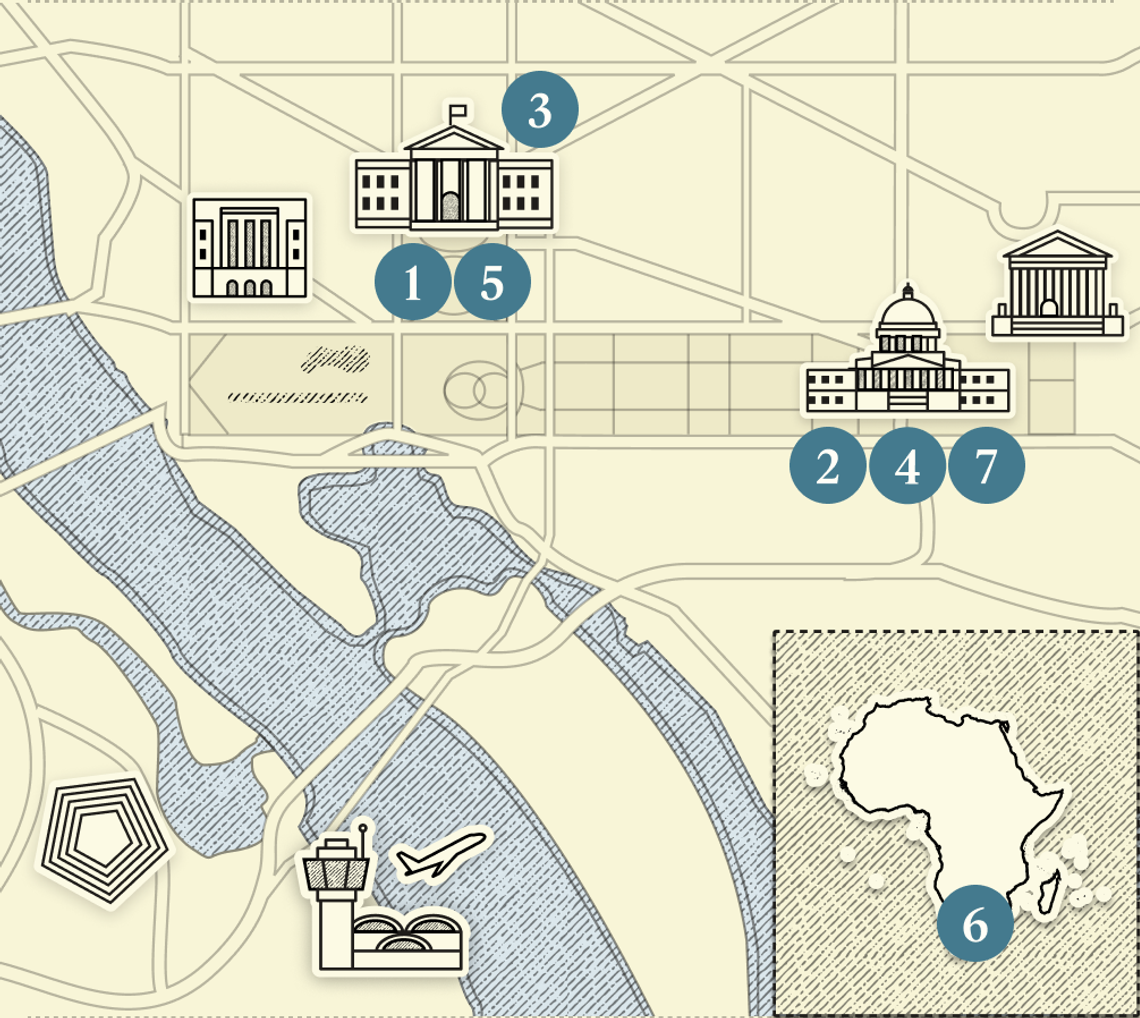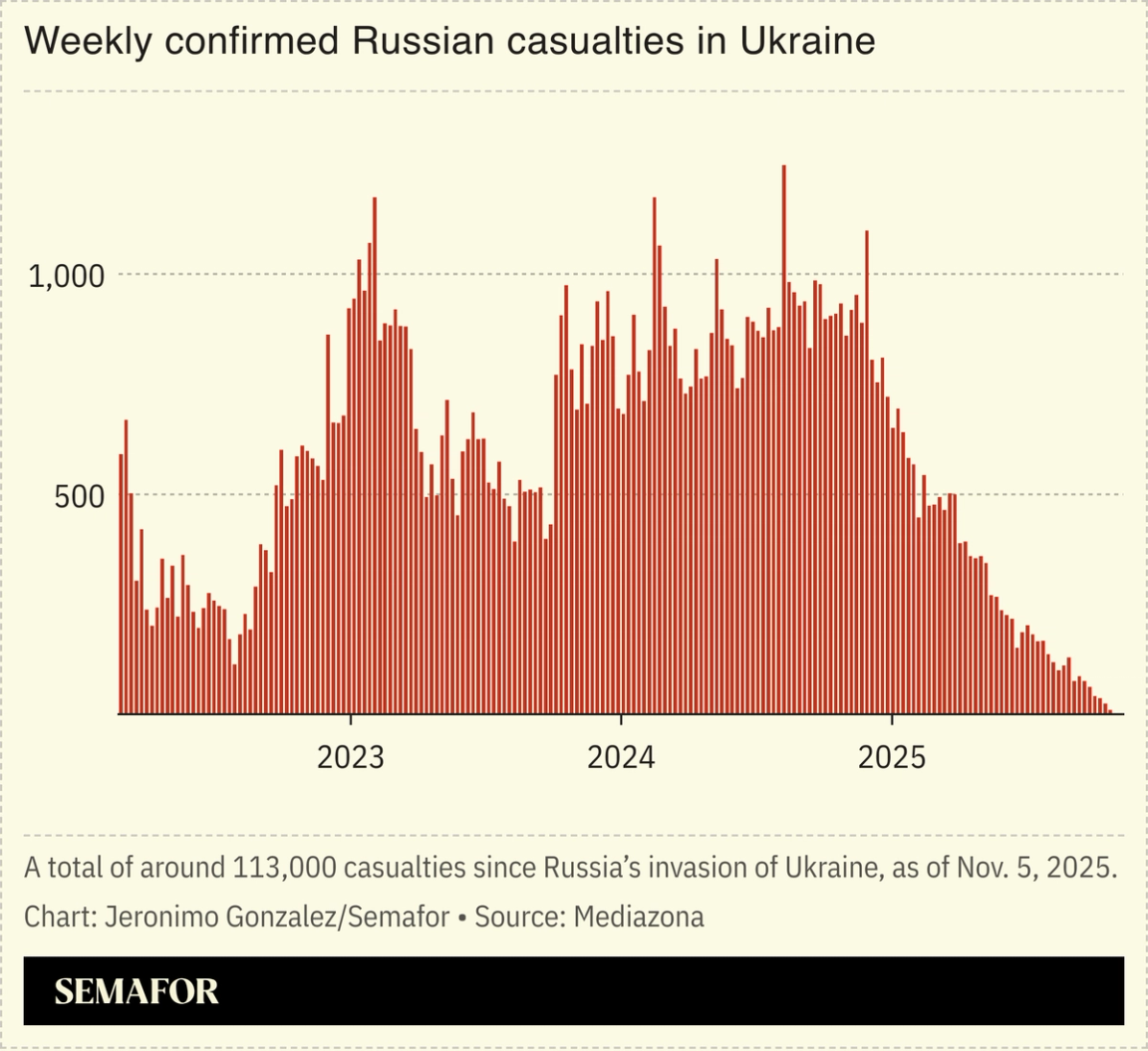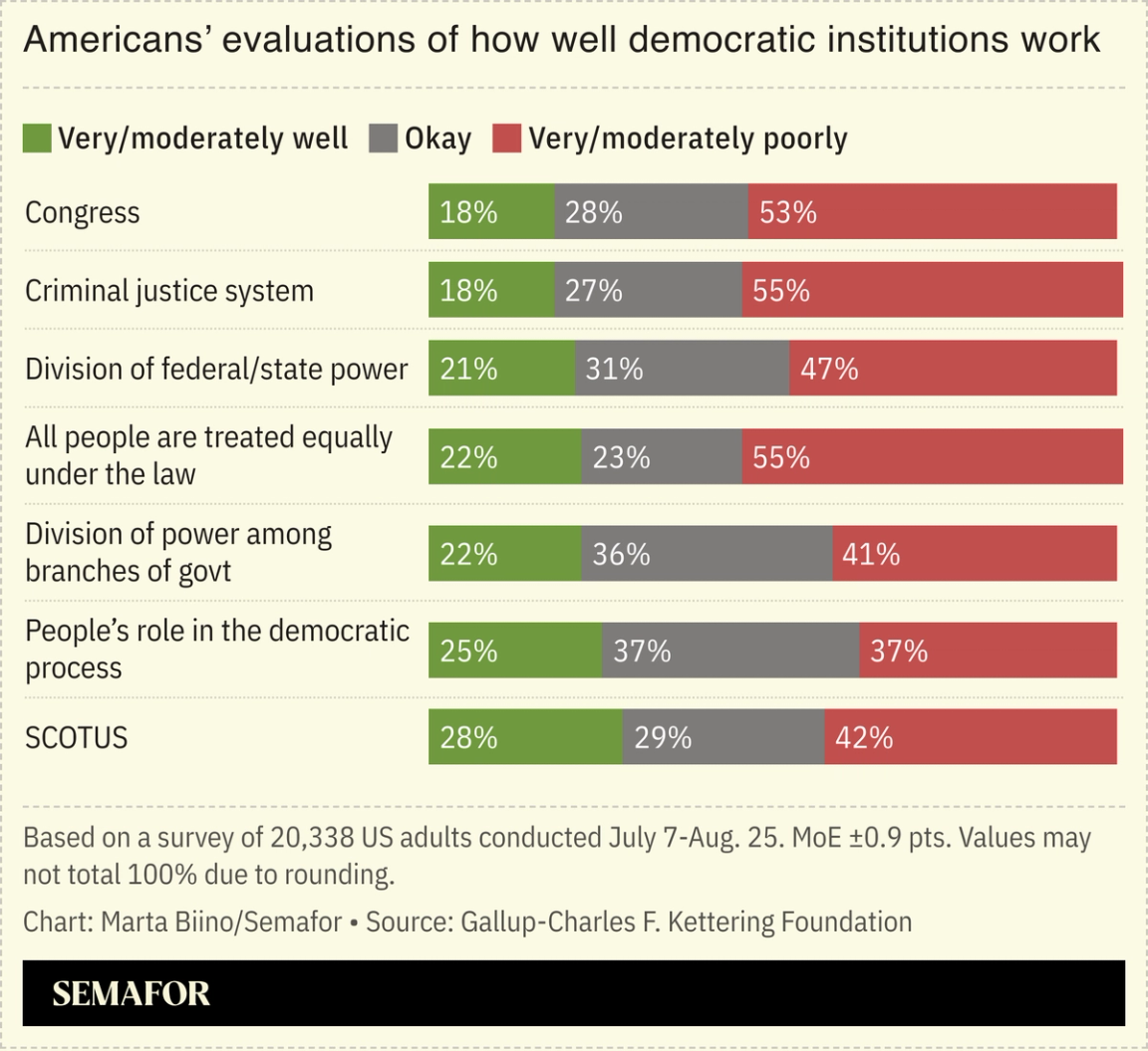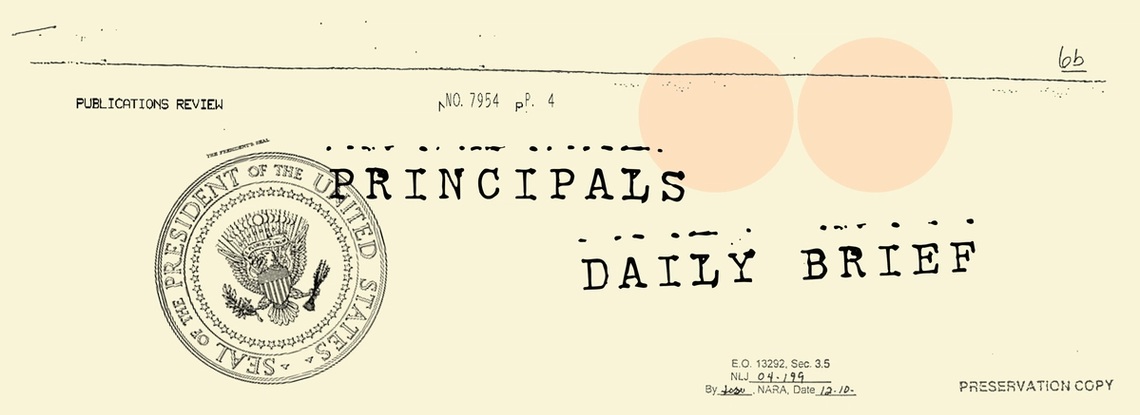| | In today’s edition: Saudi’s crown prince wraps his visit to DC, and the obstacles facing a December ͏ ͏ ͏ ͏ ͏ ͏ |
| |  | Washington, DC |  |
| |
|
 - MBS wraps DC trip
- Dems’ AI stand
- Bessent saves Powell
- ACA talks’ slow start
- New Ukraine push
- US-South Africa trade feud
- Americans doubt democracy
PDB: Nvidia earnings beat expectations  Trump meets Israeli hostages … Delayed September jobs report released … House Foreign Affairs holds hearing on Nigeria |
|
Saudi crown prince’s visit heavy on fanfare |
 Evelyn Hockstein/Reuters Evelyn Hockstein/ReutersSaudi Crown Prince Mohammed bin Salman wraps his visit to Washington with plenty of fanfare and a string of deals — though details remain limited, Semafor’s Shelby Talcott, Eleanor Mueller, and Liz Hoffman report. At a US-Saudi business summit, President Donald Trump highlighted agreements including the kingdom’s promise to increase its past $600 billion in investments to $1 trillion, while mining group MP Materials said it will partner with the US military and Saudi’s state mining company to develop a rare earths refinery in the kingdom. Riyadh walked away with several concrete wins, like an AI deal that will bring data centers back to the kingdom and a promise of advanced chip exports. The crown prince also stopped by Capitol Hill for a catered breakfast with lawmakers; Rep. Brad Schneider, D-Ill., said details of the new US-Saudi defense agreement did not come up. |
|
Dems fight Trump AI provision |
 Kylie Cooper/Reuters Kylie Cooper/ReutersDemocrats are trying to fight off an attempt by Trump to insert a ban on state artificial intelligence regulations in the annual defense policy bill. And if the provision fails to get in the must-pass bill, the White House may take executive action, Semafor’s Burgess Everett and Reed Albergotti report. If this all sounds familiar, it’s because the Senate rejected the AI moratorium in the tax law earlier this year. And now, Democrats have more say: The National Defense Authorization Act is a bipartisan negotiation and Sen. Jack Reed, D-R.I., told Semafor he “absolutely” wants to keep the AI language out of it. “We have to allow states to take the lead because we’re not able to, so far in Washington, come up with appropriate legislation,” Reed said. Ultimately, the dispute is likely to be settled by congressional leaders in December. |
|
Powell exposes Trump admin fault lines |
 Evelyn Hockstein/Reuters Evelyn Hockstein/ReutersTrump isn’t done lambasting Federal Reserve Chair Jerome Powell, and now he’s candidly exposing the fault lines inside his administration over the central bank’s leadership. Speaking at Wednesday’s US-Saudi business forum, Trump complained publicly about how Treasury Secretary Scott Bessent is privately urging him against firing Powell before his term ends in May. “I’d love to fire his ass,” Trump said of Powell, later describing Bessent as “the voice of reason” amid the debacle. But there’s not unanimous consent internally, with Trump adding that Commerce Secretary Howard Lutnick is “a little bit more for firing” Powell. “The only thing Scott is blowing it on is the Fed,” Trump said, joking that he’d fire Bessent if it doesn’t get fixed. The ad-libbed moment shows that Bessent’s influence with the president remains (for now). We’ll see how he feels after the Fed’s next interest rate decision. — Shelby Talcott |
|
December health care deal an uphill battle |
 Kylie Cooper/Reuters Kylie Cooper/ReutersSenate Democrats face an uphill challenge in getting a December deal reviving expiring Affordable Care Act subsidies. There are no official negotiations going on yet — just informal talks with Republicans — and Democrats are deliberating between engaging with the GOP or forcing Republicans to vote down a subsidy extension and letting them deal with the political fallout. “If we want to get something passed, it should include some Republican input,” said Sen. Jeanne Shaheen, D-N.H. Republicans say a straight extension of the subsidies will fail and GOP Whip John Barrasso stressed that they need “major modifications, major revisions” to the ACA to consider a Democratic proposal. That leaves Democrats skeptical that the Senate can get 60 votes for anything. “There’s some [Republicans] that genuinely want to try to figure it out. Whether it’s 13? That’s questionable,” said Sen. Gary Peters, D-Mich. — Burgess Everett |
|
Moment of truth for Ukraine push |
 A renewed push for a Ukraine peace agreement is testing Trump’s sway. The Trump administration’s 28-point plan calls for Ukraine to cede territory to Russia that Moscow doesn’t currently control, per Axios, while also requiring Ukraine to give up certain weapons and some US assistance, the Financial Times reported. Ukrainian President Volodymyr Zelenskyy, who was not involved in drafting the proposal, plans to meet with US Army leaders in Kyiv today. It’s a delicate moment for Zelenskyy, who faces a burgeoning corruption scandal. But the White House may be wrong to assume this makes him more likely to bend; one person familiar with Kyiv’s thinking observed it would be a political “death blow” for Zelenskyy to accept “a bad deal.” Members of Congress have been left out of the details, and Ukrainian officials are still trying to get up to speed. — Morgan Chalfant |
|
South Africa should diversify trade: Envoy |
 Semafor SemaforAs tensions between the US and South Africa simmer, Pretoria’s US envoy argued the African nation should diversify its commercial ties to protect itself from the fallout of a global transition away from multilateralism and the “weaponization of trade.” Speaking at Semafor’s Next 3 Billion event in Johannesburg, Mcebisi Jonas argued South Africa must strengthen trade with the US and EU, “but also begin to look at markets where we could be stronger,” like Canada and “parts of the East.” Jonas’ comments add a new dimension to the US-South Africa trade feud. When Trump imposed a 30% tariff on South African imports over laws he claims unjustly discriminate against white South Africans, President Cyril Ramaphosa characterized the move as a “wake-up call.” Jonas is “openly arguing that South Africa must rebuild its trade doctrine for a harsher, multipolar world,” Semafor’s Sam Mkokeli writes. |
|
Americans’ poor review of US democracy |
 Americans are down on democracy as Congress struggles to do things as basic as keeping the government funded. Two-thirds of US voters say democracy is the best form of government, according to a new report from Gallup and the Charles F. Kettering Foundation, but 51% say that US democracy is working poorly, and just 24% think it’s working well. The results can be even worse for specific institutions: Only 18% of Americans say Congress is working well, while 29% say the same of the presidency and 28% say so of the Supreme Court. Republicans are more likely than Democrats to say democracy is performing well overall, likely because the GOP currently controls both Congress and the White House. |
|
 Here’s a telling question: Where did the Chris Van Hollen-for-leader talk come from? It started with the Maryland Democratic senator’s trip to El Salvador to meet with Kilmar Ábrego García, wrongly deported there by the Trump administration, while other Democrats worried about the optics. It continued with Van Hollen’s invitation to an Iowa fundraiser, which charged up speculation about a presidential bid, despite his insistence that he wasn’t interested. Then, after Democrats struck a deal to end the shutdown — a move opposed by Van Hollen, who represents hundreds of thousands of federal workers — progressive activists circulated a memo explaining why he should lead their party in the Senate. In the aftermath of the shutdown and the party’s successful off-year elections, the Democrats who’ve taken the biggest risks have seen the biggest benefits. |
|
 In Washington, economic power no longer follows party lines. The old frameworks — left vs. right, House vs. Senate, Republican vs. Democrat — no longer fully explain how economic power moves in the Capitol. Today’s influence moves through a wide network, from traditional power brokers to ideological outliers, dealmakers, and policy entrepreneurs. Join us Dec. 10 for exclusive one-on-one conversations with leaders including Sen. Josh Hawley (R–Mo.) and Sen. Mark Warner (D–Va.), as we map the people moving capital, shaping policy, and redrawing the blueprint of economic power. Dec. 10 | Washington, DC | Request Invitation |
|
 Beltway NewslettersPunchbowl News: House Speaker Mike Johnson downplayed reports of a schism with Senate Majority Leader John Thune: “There’s no daylight between us.” Playbook: On the President Trump-Zohran Mamdani meeting: “The coming-together of the two standout politicians of 2025 has the feel of a glorious end-of-season finale. We can only pray they’ll invite the cameras in to watch.” Axios: As polls show voters souring on Republicans over the rising cost of living, Trump administration officials say they are confident that prices will ease in the first quarter. WaPo: “This is further than Congress has ever gotten to banning stock trading,” Rep. Brian Fitzpatrick, R-Pa., said as proposed legislation gains momentum. “I am supremely confident that we will get a bill to the floor.” |
|
|